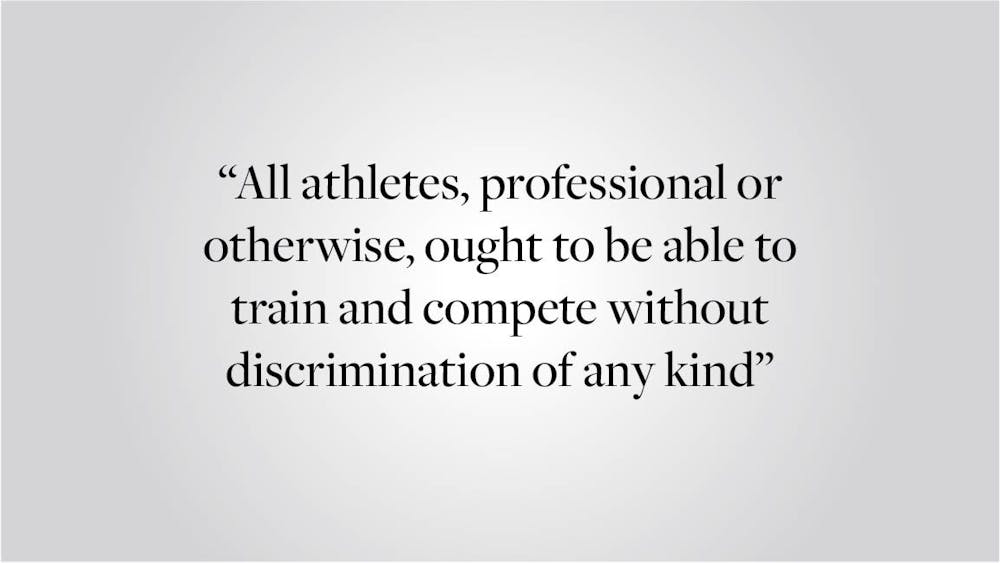On Jan. 19, the French Senate voted 160 to 143 in favor of banning the hijab in sports competitions, the latest in a long line of gendered Islamophobic policies that expose the state’s willingness to police and target Muslim women in the name of secular liberation.
Mama Diakité, who has played club soccer for a decade with a hijab, regards the ban as “the end of soccer” for her. Another hijabi soccer player, Founé Diawara, recalls sitting out of local tournaments that prohibited headscarves: “I was trapped between my passion (for soccer) and something that is a huge part of my identity. It’s like they tried to tell me that I had to choose between the two.”
The amendment was originally proposed by France’s main right-wing party, Les Républicains, who argued that headscarves posed a safety concern to athletes. This claim, however, is patently false. Various fitness wear brands have developed new headcover designs that further ensure players’ safety, such as Velcro straps that release when pulled on (it was precisely this innovation that led the International Football Association Board to lift its own hijab ban in 2012).
Beyond the dubious claim of athlete safety, this bill is grounded in the French Parliament’s distortion of secular and feminist values that can be traced through more than 200 years of French history.
One of the distinctive features of the French Revolution was the violent separation of church and state. As a result, the newly-formed Republic adopted a strict policy of laïcité, which roughly translates to secularism. In 1905, state secularism was enshrined in law, relegating religion to the private sphere while also bringing French citizenship and values into the foreground of public life.
The large group of Maghrebi immigrants who came to France in the ’60s and ’70s — which has grown into a large portion of today’s French-Muslim population — encountered laïcité in the form of state-sanctioned assimilation policies. By the turn of the century, these policies extended to certain restrictions on Islamic dress, including a 2004 ban on conspicuous religious symbols in public schools, such as niqābs, yarmulkes, large crosses and burqas. The attack on Muslim women’s dress culminated in 2010 with the passage of a parliamentary act providing that “No one shall, in any public space, wear clothing designed to conceal the face.” The act was justified on the grounds of protecting women’s rights and upheld by the European Court of Human Rights in the name of vivre ensemble (“living together”) in a democratic society. In this sense, laïcité reaches far beyond the American model of freedom of religion; it represents a kind of civil religion which seeks to shape the identity of the citizenry, as well as certain physical aspects of the public sphere.
Proponents of the bill also prop up their arguments by invoking feminism. It is commonplace for members of the French Parliament to refer to hijabi women as “imprisoned,” “fenced in,” “forced” and “victim” in debates. And while it is conceivable that some subset of Muslim women is coerced into covering their heads, by perceiving the hijab as a monolith of misogyny, French politicians ignore the many women that freely choose to wear a headcovering. To some, wearing a hijab is simply a form of religious expression; to others, the hijab is viewed as a protest against the hegemony of the West. Thus, viewing the hijab as purely a symbol of “religious defiance,” in the words of Columbia Law Professor Seyla Benhabib, merely “reimprisons (Muslim women) within the walls of patriarchal meaning from which they are trying to escape.”
Is the exclusion of Muslim women from sports competitions really the antidote to the French government’s concerns for sexism and secularism? The answer is a resounding no.
The weakness of the arguments in favor of an ever-expanding hijab ban and the clear harms posed to Muslim women have caused critics to question the underlying motives behind such legislation. Just a year ago, French members of parliament passed an “anti-separatism” bill which similarly hoped to root out radical Islamists and protect French secular values by increasing surveillance over mosques, sports clubs and schools. This bill, like the hijab sports ban, is cleverly disguised as neutral, but in practice overtly targets a French-Muslim community of 5.7 million people. With the French presidential election just two months away, French President Emmanuel Macron’s centrist party, La République En Marche!, has a clear incentive to indulge the fast-growing right wing with anti-immigrant, nationalist legislation.
With the Paris 2024 Olympics on the horizon, there has never been a more crucial time to stand up to the French government and demand this amendment be repealed. All athletes, professional or otherwise, ought to be able to train and compete without discrimination of any kind.
Alex Fasseas ’23 can be reached at alexander_fasseas@brown.edu. Please send responses to this opinion to letters@browndailyherald.com and op-eds to opinions@browndailyherald.com.





